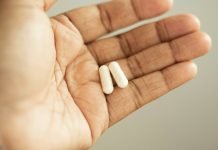
A collaborative study led by the University of Maine reveals that Vitamin B supplements could be a key strategy in controlling drug-resistant high blood pressure, a condition affecting a significant portion of the global population.
Understanding Drug-Resistant Hypertension
The Challenge: Around 12.8% of the world experiences drug-resistant hypertension, where blood pressure remains high despite using multiple antihypertension medications.
With new standards defining hypertension at lower levels (130/80 mmHg), managing this condition has become increasingly challenging.
The Role of Homocysteine and Vitamins B
Link Between Homocysteine and Blood Pressure: Homocysteine, a compound in vitamin metabolism, becomes elevated due to genetic factors or a lack of vitamins like B6, B12, folate, and riboflavin (B2).
High homocysteine levels are associated with risks for high blood pressure, heart disease, and stroke, primarily due to its impact on nitrous oxide synthesis and small vessel constriction.
Vitamin Supplementation Benefits: The study indicates that supplementing with vitamins B2, B6, B12, and folate can significantly lower blood pressure, by 6 to 13 mmHg.
This approach offers a cost-effective method for managing hypertension, especially when conventional medications are insufficient.
Need for Updated Health Standards
Redefining Normal Homocysteine Levels: The current normal range for homocysteine is up to 10 μmol/L, but many labs consider levels as high as 11.4 μmol/L normal. Researchers suggest revising these standards to reflect lower, risk-protective homocysteine levels.
Implementing Vitamin Treatment
A Complementary Approach: Incorporating vitamin treatment could be vital in managing drug-resistant hypertension. However, it’s crucial that such therapies are overseen by physicians or qualified healthcare providers to ensure safety and effectiveness.
Broader Implications: This research not only provides a new avenue for hypertension management but also highlights the importance of nutritional supplementation in overall cardiovascular health.
Conclusion
This groundbreaking study presents Vitamin B supplementation as a promising adjunct therapy for individuals struggling with drug-resistant hypertension.
By addressing elevated homocysteine levels, this approach offers a new, accessible means of blood pressure control.
The research underscores the need for updated health standards regarding homocysteine and advocates for a holistic, physician-guided approach to hypertension treatment.
This finding could have significant implications for improving the quality of life and health outcomes for millions worldwide.
If you care about high blood pressure, please read studies about unhealthy habits that may increase high blood pressure risk, and drinking green tea could help lower blood pressure.
For more information about high blood pressure, please see recent studies about what to eat or to avoid for high blood pressure, and 12 foods that lower blood pressure.
Copyright © 2023 Knowridge Science Report. All rights reserved.




